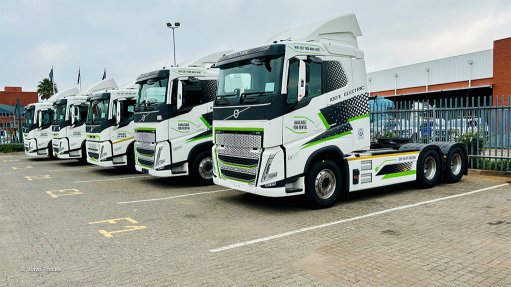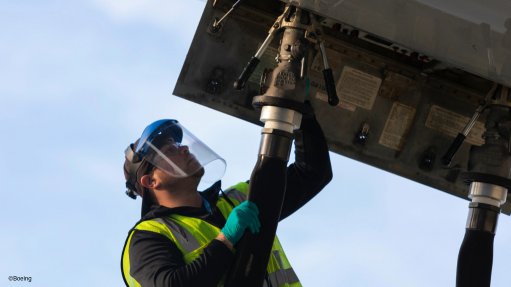First high-speed railway safety standards in South Africa
This article has been supplied as a media statement and is not written by Creamer Media. It may be available only for a limited time on this website.
A high speed railway system may not be on the cards for South Africa in the near future, however, GIBB, South Africa’s leading black owned multi-disciplinary engineering consulting firm, has given the country a head start by developing a suite of safety standards for the construction of such systems.
The process of creating the new standards used a systematic approach that achieved maximum results in the minimum time.
The suites of High-Speed Railway Safety Standards were handed over to the Railway Safety Regulator (SRS) Centurion offices in December 2016. GIBB Technical Executive: Railway Engineering, Dr Willem Sprong, said that whilst a high-speed railway system didn’t yet exist in South Africa, the project was a proactive measure to ensure maximum safety if such a railway system was to be built in the country.
A high-speed railway system involves trains travelling at speeds beyond 250km/h. Currently, the country’s state-of-the-art Gautrain clocks a top speed of only 160km/h.
Sprong said it had been exciting to be a part of the project as it was the first of its kind in South Africa, but that the process of developing the suites of standards had been an interesting learning curve.
The project cost R4,8 million and was completed in 18 months. Sprong said the firm used a unique, systemic approach that saw nine suites being developed.
GIBB developed all nine suites simultaneously while running through the theoretical life cycle of the infrastructure. This meant that the turnaround time of the project was significantly shorter than if the nine suites had been developed individually, which could have taken up to five years. Apart from the development of the suites, management of the project design also took place, with all elements meeting the criteria of the South African Bureau of Standards (SABS). “The difference with this approach was that it detailed everything from inception until decommission, which meant looking 30 years ahead,” Sprong said.
“It included all safety issues and within that, the environmental impact, thereby developing a comprehensive risk-management process that can be adhered to throughout the whole life cycle,” he continued.
The nine suites were:
- General standard – Overview of the Suites.
- Rolling stock – The wheeled vehicles of a railway, including locomotives, freight cars, and passenger cars.3. Operations – Train scheduling and train controlling, including routes and timetables.
- ICT – Communications, technology and computer software.
- Human factors – Identifying available skills, skills development and retaining skills.
- Stations, reserves and depots – Platforms and interface with passengers.
- Electrical systems – Overhead lines that provide power to trains and substations.
- Track and civil infrastructure – Railway lines, drainage and the infrastructure tracks, signals and bridges.
- Train control and authorisation – The signalling system, the physical technology used to track and locate the train using lights or GPS.
Sprong said the team was small and one person had been tasked with development of each suite. The team included a project manager and a project administrator.
One of the main challenges was getting the railway services to buy into the new approach. “It made sense to us, but we had to get the railway services to buy into the idea and get their feedback on time,” said Sprong.
He said the project involved intense research because it required taking stock of South Africa’s environment, skills and industry.
Sprong said that on a personal level the project had been an amasing experience, as he’d got to work with men who’d been involved at the very beginning of railway safety services. “I had the opportunity to work with Mervyn Panzera, the first CEO of the RSR. It was interesting to see how someone with his experience approached railway safety,” he said.
He added that it had also been a great experience working with BEE company Mani Industries. “It was amazing to see the development of skills in a black-owned company and an example of how working with a supply and development partner can be successful,” said Sprong.
Sprong said GIBB had proposed to the RSR that the company train their staff, introduce them to the HSRSS and develop a training manual so that they understand how to implement the standards. He hoped that the suites would eventually be adopted the South African Bureau of Standards (SABS).
Comments
Press Office
Announcements
What's On
Subscribe to improve your user experience...
Option 1 (equivalent of R125 a month):
Receive a weekly copy of Creamer Media's Engineering News & Mining Weekly magazine
(print copy for those in South Africa and e-magazine for those outside of South Africa)
Receive daily email newsletters
Access to full search results
Access archive of magazine back copies
Access to Projects in Progress
Access to ONE Research Report of your choice in PDF format
Option 2 (equivalent of R375 a month):
All benefits from Option 1
PLUS
Access to Creamer Media's Research Channel Africa for ALL Research Reports, in PDF format, on various industrial and mining sectors
including Electricity; Water; Energy Transition; Hydrogen; Roads, Rail and Ports; Coal; Gold; Platinum; Battery Metals; etc.
Already a subscriber?
Forgotten your password?
Receive weekly copy of Creamer Media's Engineering News & Mining Weekly magazine (print copy for those in South Africa and e-magazine for those outside of South Africa)
➕
Recieve daily email newsletters
➕
Access to full search results
➕
Access archive of magazine back copies
➕
Access to Projects in Progress
➕
Access to ONE Research Report of your choice in PDF format
RESEARCH CHANNEL AFRICA
R4500 (equivalent of R375 a month)
SUBSCRIBEAll benefits from Option 1
➕
Access to Creamer Media's Research Channel Africa for ALL Research Reports on various industrial and mining sectors, in PDF format, including on:
Electricity
➕
Water
➕
Energy Transition
➕
Hydrogen
➕
Roads, Rail and Ports
➕
Coal
➕
Gold
➕
Platinum
➕
Battery Metals
➕
etc.
Receive all benefits from Option 1 or Option 2 delivered to numerous people at your company
➕
Multiple User names and Passwords for simultaneous log-ins
➕
Intranet integration access to all in your organisation


















